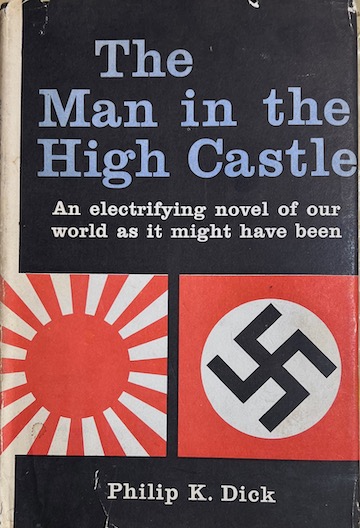Part 8 Philip K Dick 1971 Interview

Philip K. Dick: No. The Man in the High Castle was an anomaly.
What happened was, I had to quit writing. I had given up writing for a variety of reasons and one of them being, I didn’t have any more to say. I went into the jewelry business and I had a pretty good time. I had a good time in writing. I made more money. It worked out pretty good. Found out I didn’t have any ability. At least that’s what my wife said, “You don’t have any ability, Bill. You are going to be a failure, I know you would.” So I said to my psychiatrist, “How do I get out of this jewelry business?” He says, “pretend you are writing another novel.” I said, “You know I am all washed up as a writer.” He said, “I know, but nobody else does.” They won’t know that until you are finished. I mean, you have a year you know. You can sit there and write. See Jane run, you know, pretend you are writing a first grade poem. Let me sit there and write, you know and say I am writing a novel. Your wife didn’t know the difference in you. As long as you work hard, get up early in the morning. You know, look emaciated. Have a martini and do that sort of stuff, you know, she will think you are writing a novel. So I went and I did. I never really know what I was writing. I said, “Let us see what do I say this is about.” And I thought, well when I was really little, I always wondered about what will it be like if the Nazi’s and Japanese had won. Because I lived during that war and I used to think that at that time.
James Holmes: [laughs]
Philip K. Dick: When it wasn’t quite so clear what the outcome would be. You know, like I say, “Gosh, it is going to be interesting saying Guten Morgen Frank!” Every morning to the guy next door instead of whatever you say now. So I thought about it then and then we won the war and then I forgot about it. So I said I will write about that. So I thought, what do I need in a way of not spelling the name of a Japanese character in the middle of the west coast. Because that is where I lived. I don’t want to have to make up streets in New York because I don’t know what New York is like. So I said, I will call him Mr. Summer. Then I thought up his name and this is where I wrote about five things down and I start typing. I said to my wife that evening, “Gosh, my novel is coming on pretty good.” And she said, “Better because we need such and such amount of money for orthodontist working on and the taxes are going up. I got it all finished and showed it to her. She said, “You make about $700 a year, you are a failure. I always knew you would be.” So I sent it off. It was an anomaly. And it won the Hugo Award and made my wife rich.
James Holmes: [laughs]
Philip K. Dick: I knew you would be a failure, she said. You only won a Hugo award with it. Why not win a Nebula. Then I had to write whole bunch of stuff after that.
James Holmes: Why? Because you won the award?
Philip K. Dick: No, because I had proved to my wife, I can still write a novel and sell it.
James Holmes: But you continued writing after that. Is that because of all those great things happened, you decided to continue writing?
Philip K. Dick: Like what?
James Holmes: Like making your wife rich? Happy? You know, or you are getting that Hugo Award. I mean, you obviously continued writing so it wasn’t—
Philip K. Dick: That seems to be true. It is nice to have something we can agree on. I mean I am not going to disagree with you but I did go on writing after that. The point was that, what choice did I have? I already screwed up in the jewelry business. I couldn’t even cut a Santa Claus, you know. A pin that fell off and dropped on the floor and I stepped on it. I burnt myself with solder, that is true. Then I have cut too far with the shears on the silver. “Phil, don’t you know a silver cost $53 a cubic centimeter? You just ruined 20 million dollars worth of silver, now you are going to have to go to your room and count to a hundred backwards somewhere which maybe. So I couldn’t go on in the jewelry business and I proved that I could still write and sell something which looked like a good idea at that time, you know. I wrote six novels in four months. At one point in six weeks, I wrote twelve hundred pages. Typed twelve hundred pages in six weeks. I did two novels simultaneously under contract. I had to write two versions of each one. I had taken one page out of the typewriter that said the end and I put it in another page that said page one. I said, “Oh my God, you know. I mean Jesus…”
James Holmes: [laughs]
Philip K. Dick: The funny thing is my wife spends it fast… I mean you know… It makes no sense. Then I got out of that marriage. I didn’t write for a while and then there was no alternative and I went back to writing. Because for me, writing is not a business. It is not craftsmanship. It is something that… Well like for instance, have you ever had a desk or a table or something with one leg that didn’t quite reach the ground you know and you continually put match book covers to try to make it not rock around. And you can’t stop yourself from going over and trying to make it so it doesn’t go bumpity-bump-bump. Well, this is the way I was with writing. If I don’t write for a while, finally, I get real… You know, like I got to go tinker with the typewriter. First, you know, I would say maybe I could sell it. And then I said, maybe if I clean the keys I can get more money for it or something like that. In person I said, “Maybe I will type something like you know, see the rich red fox jump over the lazy brown dog or whatever expressions.” And then I said, “Maybe I will write a letter to my agent to borrow some money.” And then I say, “Maybe as long as I am writing a letter to my agent to borrow some money off, pretend I am writing a story and I will give them a short synopsis of it. Then I got to think of a short synopsis. So I make up one. Then while I am making up a short synopsis, I said to myself, maybe if I write a few pages I can actually get a contract from a publisher. Maybe if I pretend it is a book I can get a bigger contract. And I do. Then I got to write the thing. Then I find that I am writing something anyway. You know, letters to the IRS explaining why I didn’t pay my taxes. I am already writing. I have to write, defensively. If I don’t write, I don’t know what else to do. I mean, it is natural. I always have written. Ever since I was in the first grade. I told myself from my…
[phone ringing]
James Holmes: (I turned off the tape recorder and we took a half hour break.)
Philip K. Dick: …typing manual.
James Holmes: This microphone is plugged in and we are being bugged by a tape recorder. So I made a beep every fifteen minutes.
Philip K. Dick: How do you make a beep?
James Holmes: Burp…
Philip K. Dick: How am I there for a level.
James Holmes: Sounds pretty good.
Philip K. Dick: Okay. Because I tend to mumble sometimes especially when I burp. Are we on? Ladies and gentlemen, this is Robert Heinlein speaking from his cozy sanctuary in the deep part of the Rocky Mountains surrounded by barb wire and don’t play that.
James Holmes: [laughs]
Philip K. Dick: Shit! Okay that… Thanks for that.
James Holmes: You are on the air.
Philip K. Dick: Not after that, you don’t have to use that. Now what were we discussing Mr. Frost?
James Holmes: Well, to tell you the truth I can’t even remember. Do you want to… We can start off on a whole different thing and try to get back to where we were.
Philip K. Dick: Okay. How do we know when we get back to where we were?
James Holmes: Uh…. [laughs]
Philip K. Dick: We will feel it. We will feel it here.
James Holmes: When we are there, we will fill in the vacuum.
Philip K. Dick: Why don’t you query me.
James Holmes: Okay. I would be really interested to know what a typical day for you was when you are working. Like what time do you get up, how many hours do you work, you know. Do you work regularly, sporadically, do you…
Continued in:
Part 9 Philip K Dick 1971 Interview

